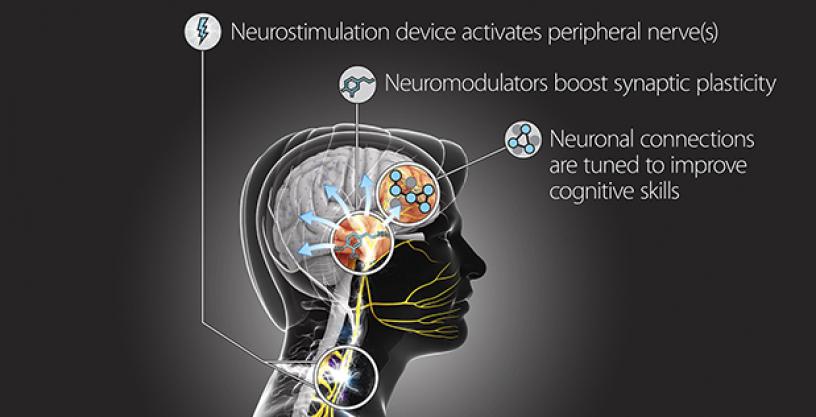
Program Summary
The Targeted Neuroplasticity Training (TNT) program supports improved, accelerated training of military personnel in multifaceted and complex tasks. The program is investigating the use of non-invasive neurotechnology in combination with training to boost the neurochemical signaling in the brain that mediates neural plasticity and facilitates long-term retention of new cognitive skills. If successful, TNT technology would apply to a wide range of defense-relevant needs, including foreign language learning, marksmanship, cryptography, target discrimination, and intelligence analysis, improving outcomes while reducing the cost and duration of the Defense Department’s extensive training regimen.
TNT focuses on a specific kind of learning—cognitive skills training. The premise is that during optimal times in the training process, precise activation of peripheral nerves through stimulation can boost the release of brain chemicals such as acetylcholine, dopamine, serotonin, and norepinephrine that promote and strengthen neuronal connections in the brain. These so-called neuromodulators play a role in regulating synaptic plasticity, the process by which connections between neurons change to improve brain function during learning. By combining peripheral neurostimulation with conventional training practices, the TNT program seeks to leverage endogenous neural circuitry to enhance learning by facilitating tuning of the neural networks responsible for cognitive functions.
DARPA is taking a layered approach to exploring this new terrain. Fundamental research focuses on gaining a clearer and more complete understanding of how nerve stimulation influences synaptic plasticity, how cognitive skill learning processes are regulated in the brain, and how to boost these processes to safely accelerate skill acquisition while avoiding potential side effects. The engineering side of the program concentrates on developing non-invasive methods to deliver peripheral nerve stimulation that enhances plasticity in brain regions responsible for cognitive functions. Human subjects research will help determine the extent to which peripheral nerve stimulation aids in key training activities. Additionally, key advances anticipated from this research will both create an anatomical and functional map of the underlying biological circuitry that mediates plasticity and optimize stimulation and training protocols to enable long-term retention of learned skills by military personnel.
TNT is informed by independent Ethical, Legal, and Social Implications (ELSI) experts to help DARPA proactively identify potential issues related to the use of neurotechnology. Communications with ELSI experts supplement the standard oversight provided by institutional review boards that govern human clinical studies and animal use.
This program is now complete
This content is available for reference purposes. This page is no longer maintained.
